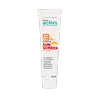What's inside
What's inside
 Key Ingredients
Key Ingredients

 Benefits
Benefits

No benefits
 Concerns
Concerns

 Ingredients Side-by-side
Ingredients Side-by-side

Titanium Dioxide 6%
Cosmetic ColorantZinc Oxide 4.7%
Cosmetic ColorantC12-15 Alkyl Benzoate
AntimicrobialButyloctyl Salicylate
Skin ConditioningNeopentyl Glycol Diethylhexanoate
EmollientParaffin
PerfumingEuphorbia Cerifera Wax
Ozokerite
Emulsion StabilisingDimethicone
EmollientBeeswax
Emulsion StabilisingPolyethylene
AbrasiveCetyl Alcohol
EmollientCeramide 3
Skin ConditioningCeramide 6 Ii
Skin ConditioningCeramide 1
Skin ConditioningCholesterol
EmollientPhytosphingosine
Skin ConditioningSodium Hyaluronate
HumectantPolyhydroxystearic Acid
EmulsifyingAluminum Hydroxide
EmollientStearic Acid
CleansingBHT
AntioxidantCarbomer
Emulsion StabilisingTriethoxycaprylylsilane
Isostearic Acid
CleansingSodium Lauroyl Lactylate
EmulsifyingXanthan Gum
EmulsifyingTitanium Dioxide 6%, Zinc Oxide 4.7%, C12-15 Alkyl Benzoate, Butyloctyl Salicylate, Neopentyl Glycol Diethylhexanoate, Paraffin, Euphorbia Cerifera Wax, Ozokerite, Dimethicone, Beeswax, Polyethylene, Cetyl Alcohol, Ceramide 3, Ceramide 6 Ii, Ceramide 1, Cholesterol, Phytosphingosine, Sodium Hyaluronate, Polyhydroxystearic Acid, Aluminum Hydroxide, Stearic Acid, BHT, Carbomer, Triethoxycaprylylsilane, Isostearic Acid, Sodium Lauroyl Lactylate, Xanthan Gum
Water
Skin ConditioningCyclopentasiloxane
EmollientC12-15 Alkyl Benzoate
AntimicrobialEthylhexyl Methoxycinnamate
UV AbsorberArachidyl Alcohol
EmollientBehenyl Alcohol
EmollientArachidyl Glucoside
EmulsifyingCetearyl Alcohol
EmollientDicetyl Phosphate
EmulsifyingCeteth-10 Phosphate
CleansingTitanium Dioxide
Cosmetic ColorantAluminum Hydroxide
EmollientStearic Acid
CleansingGlyceryl Stearate Se
EmulsifyingVp/Eicosene Copolymer
Polysorbate 20
EmulsifyingButyl Methoxydibenzoylmethane
UV AbsorberBis-Ethylhexyloxyphenol Methoxyphenyl Triazine
Skin ConditioningPhenoxyethanol
PreservativeEthylhexylglycerin
Skin ConditioningTocopheryl Acetate
AntioxidantDisodium EDTA
Water, Cyclopentasiloxane, C12-15 Alkyl Benzoate, Ethylhexyl Methoxycinnamate, Arachidyl Alcohol, Behenyl Alcohol, Arachidyl Glucoside, Cetearyl Alcohol, Dicetyl Phosphate, Ceteth-10 Phosphate, Titanium Dioxide, Aluminum Hydroxide, Stearic Acid, Glyceryl Stearate Se, Vp/Eicosene Copolymer, Polysorbate 20, Butyl Methoxydibenzoylmethane, Bis-Ethylhexyloxyphenol Methoxyphenyl Triazine, Phenoxyethanol, Ethylhexylglycerin, Tocopheryl Acetate, Disodium EDTA
Ingredients Explained
These ingredients are found in both products.
Ingredients higher up in an ingredient list are typically present in a larger amount.
Aluminum Hydroxide is a form of aluminum. It can be naturally found in nature as the mineral gibbsite. In cosmetics, Aluminum Hydroxide is used as a colorant, pH adjuster, and absorbent.
As a colorant, Aluminum Hydroxide may add opacity, or reduce the transparency. Aluminum hydroxide is contains both basic and acidic properties.
According to manufacturers, this ingredient is an emollient and humectant. This means it helps hydrate the skin.
In medicine, this ingredient is used to help relieve heartburn and help heal ulcers.
There is currently no credible scientific evidence linking aluminum hydroxide in cosmetics to increased cancer risk.
Major health organizations allow the use of aluminum hydroxide in personal care products and have not flagged it as a carcinogenic risk at typical usage levels.
Learn more about Aluminum HydroxideC12-15 Alkyl Benzoate is made up of Benzoic Acid and long chain alcohols. It has a low molecular weight.
C12-15 Alkyl Benzoate is an emollient and texture enhancer. Due to its solubility, it is often used in sunscreens to help evenly distribute active ingredients.
As an emollient, C12-15 Alkyl Benzoate helps soften and hydrate your skin. Emollients create a film on your skin that traps moisture within.
This ingredient has been reported to cause eye irritation.
Learn more about C12-15 Alkyl BenzoateStearic Acid is a fatty acid. It is an emollient, emulsifier, and texture enhancer.
As an emollient, stearic acid helps soften skin. It aids the skin's protective barrier by preventing water loss. It also provides a gentle cleansing effect without stripping away natural oils.
Stearic acid may also be used to enhance the texture of products. It can add volume and stabilize ingredients such as water and oil. This can help water and oil ingredients from separating.
Sources of stearic acid include animal or vegetable fats/oils such as coconut or shea. It can be naturally found in butter, cocoa butter, shea butter, vegetable fats, and animal tallow.
This ingredient may not be Malassezia folliculitis, or fungal-acne safe.
Learn more about Stearic AcidTitanium dioxide is a mineral UV filter widely used in sunscreens and cosmetics.
It is one of only two UV filters officially classified as “mineral” by regulatory agencies, the other being zinc oxide.
Titanium dioxide provides broad-spectrum protection mostly in the UVB and UVAII range, with some protection in the UVAI range.
While its UVA protection isn’t as strong as zinc oxide’s, the difference is minor.
A common myth is that mineral UV filters reflect UV light. However, modern research shows titanium dioxide absorbs UV radiation like chemical filters (~95% absorption & 5% reflection).
Thanks to its non-irritating nature, titanium dioxide is suitable for sensitive, acne-prone, or redness-prone skin. It is unlikely to cause "eye sting" like other sunscreen ingredients.
A major drawback of this ingredient is its white cast and thick texture. This is why mineral sunscreens often leave a white cast and are less cosmetically elegant than chemical/hybrid sunscreens.
To improve white cast and spreadability, micronized or nano-sized titanium dioxide is often used.
There are ongoing concerns surrounding nano-titanium oxide's impact on marine ecosystems.
There is no conclusive evidence that any form of titanium oxide (or any other sunscreen ingredients) will cause harm to marine ecosystems or coral reefs. The science is still developing but many consumers are keeping a close eye on this issue.
Please note, many destinations have reef-safety sunscreen rules. For instance, the U.S. Virgin Islands advises all visitors to use non-nano mineral sunscreens.
Nano mineral sunscreens once raised safety concerns about absorption into skin.
Extensive research has shown that they do not penetrate healthy or damaged skin; they remain safely on the surface and the top layer of dead skin (stratum corneum).
You'll likely find titanium dioxide bundled with alumina, silica, or dimethicone. These ingredients help make titanium dioxide highly photostable; this prevents it from interacting with other formula components under UV light.
Learn more about Titanium Dioxide